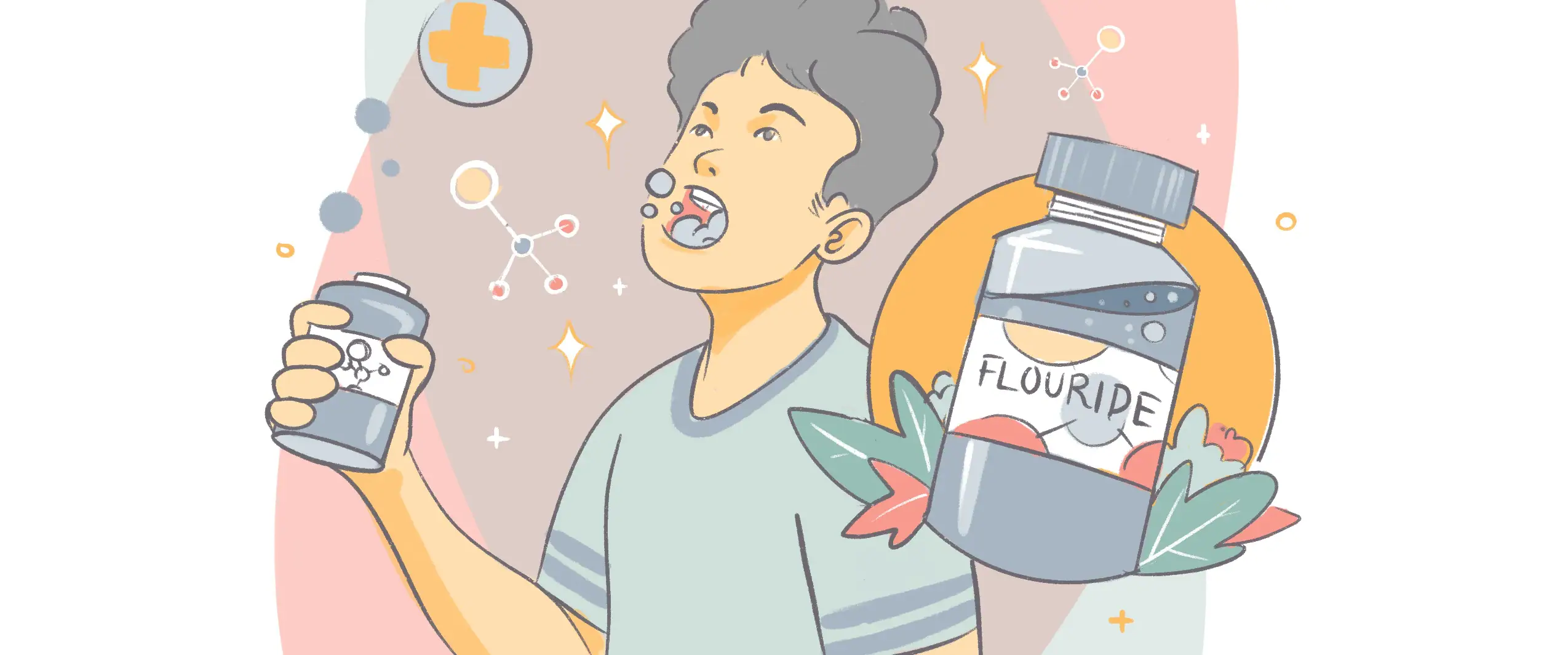Nothing feels as good as a fresh mouth! (Ok, that may be up for discussion.) But seriously, fresh breath and that cool tingle of a proper fluoride mouthwash feel pretty amazing. A fluoride mouthwash is different from the typical kinds. Fluoride mouthwash will strengthen (and whiten!) your teeth, reduce decay, and leave your mouth feeling sooo good. Let’s explore.
Fluoride mouthwash ingredients
No surprise here, but the main ingredient fluoride! This mineral occurs naturally in certain foods, water, and soil. It can also be synthetically produced and is a component of lots of oral health products. Fluoride is mainly used for cavity and decay prevention. Many countries add it to their drinking water to provide these dental benefits to the general population.
Find a top rated dentist near you that takes your insurance.Due for a checkup?
Other ingredients in fluoride mouthwash can vary but often include antiseptics (which work to kill gingivitis and plaque-causing bacteria in your mouth), odor neutralizers (which reduce sulfur compounds leading to bad breath), astringent salts (which can mask bad breath), and various teeth whiteners.
The difference between fluoride and non-fluoride mouthwash
Non-fluoride mouthwash can contain some of the same ingredients as fluoride wash. Rinsing with non-fluoride wash is an improvement to using no mouthwash, but its lack of fluoride means it’s not cleaning your teeth. The same protection from decay is not provided, and the emergence of cavities is more likely.
Make sure to check the ingredients of the mouthwash you’re about to buy. If you’re looking for fluoride mouthwash, read the ingredients list to confirm it’s explicitly stated as a main component, as it’s not included by default in all washes.
Due for a checkup?
Find a top rated dentist near you that takes your insurance.
Fluoride mouthwash benefits
To understand the benefits of a fluoride wash, let’s first look at how tooth decay happens. When dental plaque begins to form in the mouth, certain kinds of bacteria contained within it produce acids which destroy the enamel and dentin of the tooth. This is called demineralization and it can lead to cavities if enough of the tooth is destroyed.
Fluoride helps remineralize the tooth by adding minerals to the damaged areas. It helps the body use calcium and phosphate to repair teeth. It boosts enamel growth and makes teeth more resistant to future acid decay. Fluoride wash can also reduce the growth of harmful oral bacteria, therefore preventing even more acid damage.
Fluoride wash is particularly useful for those with increased risk of tooth decay. This includes people with dry mouth, as fewer particles get washed away by saliva, thereby leading to more plaque. Those with braces, bridges, retainers, and crowns are at a higher danger for tooth decay as well, as food particles can get stuck around these additions. And of course, people with a history cavity and gum disease definitely benefit from fluoride washes.
Fluoride mouthwash side effects
Fluoride mouthwash tends to be safe when used in moderation, but overuse can lead to various complications. Of course if you have questions or concerns, consider seeing your dentist.
It’s strongly recommended kids under six don’t use fluoride mouthwash. Overexposure can cause dental fluorosis, where a child’s mature teeth will develop with white specks or streaks. While not harmful, they may affect the aesthetic quality of their smile and cannot be removed in the future.
High exposure to fluoride can also cause skeletal fluorosis. This disease can damage a person’s bones and joints, leading to pain. While unlikely to be caused by mouthwash, most cases are linked to locations where the drinking water has a level of fluoride higher than is recommended.
Other side effects of toxic-level fluoride use include thyroid problems, nausea, dizziness and diarrhea. Note however that these side effects aren’t a concern if fluoride mouthwash is used correctly. They’re only dangerous in case of routine ingestion of too much fluoride.
Also, a small number of people may have an allergic reaction to fluoride. If you experience rashes, itching, swelling, difficulty breathing, or dizziness, immediately reach out for emergency medical help.
Combining fluoride mouthwash with fluoride toothpaste
While fluoride mouthwash offers lots of benefits, it’s only one of the components of good oral health. Flossing should always be the first step, followed by a diligent brushing! You can use both a fluoride toothpaste and a fluoride mouthwash, but you should wait a few minutes after brushing to avoid washing the fluoride off.
For young children, use only a pea-sized amount of toothpaste. Monitor their teeth while brushing to ensure they are doing so correctly and that they don’t swallow too much fluoride. And remember, don’t let kids under six use mouthwash.
What’s a fluoride rinse treatment?
A fluoride rinse is a professional treatment administered by a dentist. It may be applied with a swab (around your teeth and gums), a wash, or brush. It can come in the form of a liquid, gel, foam, or varnish. After application, you may be asked to refrain from eating or drinking for a set period of time.
Find a top rated dentist near you that takes your insurance.Due for a checkup?
A professional fluoride rinse contains a considerably larger amount of fluoride than would be found in your fluoride wash or fluoride toothpaste (although still within a safe range). It results in similar benefits to those of regular fluoride mouthwash, which show up more intensely and more rapidly due to the higher fluoride concentration.
In some cases, your dentist may also prescribe a fluoride treatment to take home. In these cases, the treatment is most likely to be a wash with a higher fluoride concentration than regular fluoride wash. You may have to specifically find a dentist who offers this service.
How to use a fluoride mouthwash
- Start by flossing and brushing your teeth. If you’re brushing with a fluoride toothpaste, wait a few minutes before you use your mouthwash.
- Read the instructions of your fluoride wash to find out what the recommended amount is. Measure it out carefully.
- Take the wash into your mouth and swish it around vigorously. And don’t swallow it! Just swish, gargle, and spit.
- Wait a half hour before eating or drinking anything – even water!
When used properly, fluoride mouthwash will protect and strengthen your teeth – and maybe even make them whiter. And you can use it once or twice daily, but always use it properly. Just read the label and follow any instructions your dentist has given you. So take a swish and you’ll be smiling hard before you know it!








